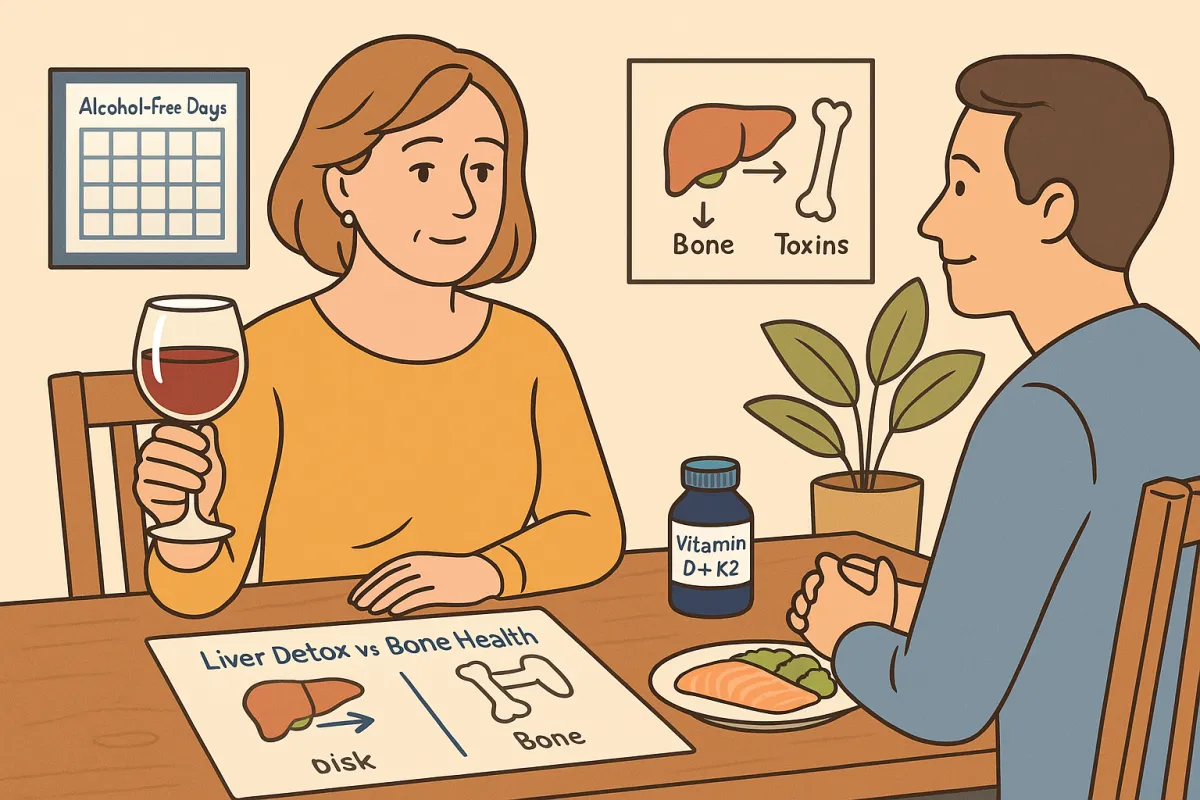
🍷 Alcohol and Your Bones: How Much Is Too Much?
You’ve probably heard that drinking too much can affect your health — but did you know it can impact your bones too?
Let’s break down how alcohol interacts with bone health, what the research says, and what you can do to protect your skeleton without giving up your social life.
🚨 What Alcohol Does to Your Bones
Excessive alcohol intake interferes with bone remodeling — the process where your body breaks down old bone and builds new bone.
Too much alcohol can:
Decrease the activity of osteoblasts (the cells that build bone)
Interfere with calcium and vitamin D absorption
Alter hormone levels that regulate bone growth (like estrogen and testosterone)
But there’s more to the story…
🧬 A Functional Medicine Insight: Your Liver's Role
When you drink alcohol, your liver kicks into overdrive to metabolise it. Because the body treats alcohol like a toxin, it prioritises getting it out of your system — often at the expense of other critical functions.
Here’s what can happen:
Your liver temporarily slows down detox processes for other compounds, including inflammatory byproducts and environmental toxins
This can increase oxidative stress and systemic inflammation, both of which negatively affect your bones
Chronic alcohol use can even impair nutrient activation, including vitamin D, which is essential for bone health
In short: your liver can either clear alcohol or support long-term health — but it can’t do both at once. That’s why even moderate, consistent alcohol use can gradually chip away at your resilience, including your bones.
🍷 How Much Is “Too Much”?
Most studies define “moderate drinking” as:
Up to 1 drink per day for women
Up to 2 drinks per day for men
One drink means:
150ml (5 oz) of wine
375ml (12 oz) of beer
30ml (1 oz) of spirits
Higher levels of consumption — especially more than 3–4 drinks per day — are strongly linked with reduced bone density and increased fracture risk.
⚖️ Occasional vs. Chronic Drinking
Having a glass of wine at dinner a few times a week is unlikely to harm your bones — especially if the rest of your lifestyle supports bone health.
The real concern is chronic heavy drinking or binge drinking, which:
Disrupts bone remodeling
Raises inflammation
Impairs nutrient absorption
Burdens your detox systems
✅ Bone-Friendly Drinking Strategies
If you enjoy alcohol, here are some simple ways to protect your bones:
Stick to low-to-moderate intake
Aim for 0–1 drink per day, with alcohol-free days built into your week.Don’t skip meals
Drinking on an empty stomach may increase bone turnover and reduce nutrient absorption.Support your nutrient intake
Make sure you’re getting enough calcium, magnesium, vitamin D, and protein.Hydrate
Alcohol dehydrates, and your body needs water for bone turnover and detox pathways.Think beyond the drink
Pair alcohol with bone-supportive habits: strength training, good sleep, and smart supplementation.
Final Thought
You don’t have to give up alcohol entirely to care for your bones. But if you’re dealing with low bone density or want to optimise your long-term health, it's worth pausing to reflect.
Your liver plays a big role — and when it's busy clearing alcohol, it can't support detox and inflammation regulation as effectively. Over time, that can ripple into your bones.
So the key takeaway?
🍷 Drink mindfully. Balance is everything. Your bones — and your liver — will thank you.
